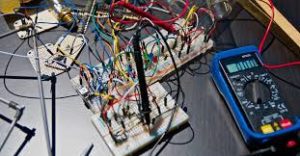An Electrician is a professional who specializes in the wiring of buildings, transmission lines, and stationary machines. They may also be employed to maintain existing electrical infrastructure. In addition, they may conduct installations of new electrical components. In addition, an Electrician may also be responsible for maintaining the electrical system within a particular business. Visit Electrician-Northwest Electric and Excavation Inc.

The job of an Electrician is incredibly rewarding, but it requires a certain set of skills to succeed. For instance, an electrician must be in great physical condition and have excellent communication skills. Additionally, he or she must enjoy problem-solving. Electricians prepare, install, and test electrical wiring as well as electrical control devices. They also troubleshoot problems in these systems. Usually, electricians work for electrical contractors.
The job description of an Electrician varies from job to job. Some work for large businesses and companies, while others focus on the residential market. A residential wireman may also install computer networks and security and fire alarm systems. In addition to residential work, an Electrician may specialize in industrial or commercial wiring or maintenance.
An electrician uses a variety of hand and power tools to complete a project. They can also use conduit benders and wire strippers. The use of hand tools is vital to the job of an Electrician. Hand tools include pliers and wrenches. A conduit bender is a tool that helps to accurately bend electrical conduit.
An electrician can also install conduit in walls during construction, install HVAC systems, and install light bulbs. An electrician can also use various testing equipment to determine whether something is functioning correctly. A skilled electrician can also help restore power to a building that has lost power. The main task of an Electrician is to make sure everything is working properly.
Most people become an Electrician after completing a trade school apprenticeship or technical school. After completion of an apprenticeship, some people choose to take the state electrician examination. However, others choose to earn their license by accumulating paid work experience. Regardless of the path you choose, it is vital to know that certification is required by most states. You can find more information about licensing requirements from your state’s electrical licensing board.
Although some Electricians choose to work as independent contractors, many choose to join unions. The largest union is the International Brotherhood of Electrical Workers (IBEW), and it has hundreds of thousands of members worldwide. Union members pay dues to the union and meet with the union’s officials. The union also creates bargaining committees that negotiate contracts with employers.
